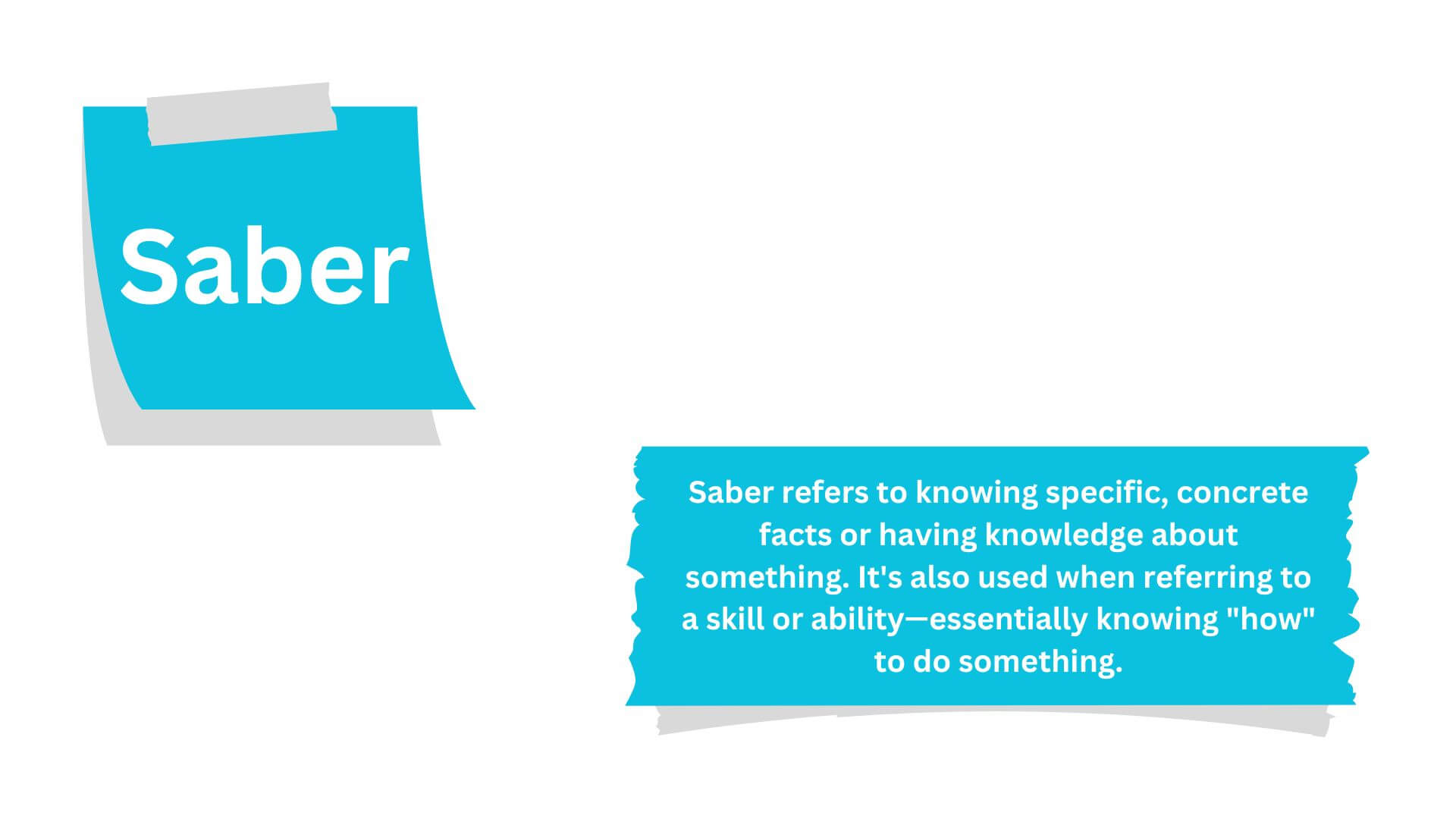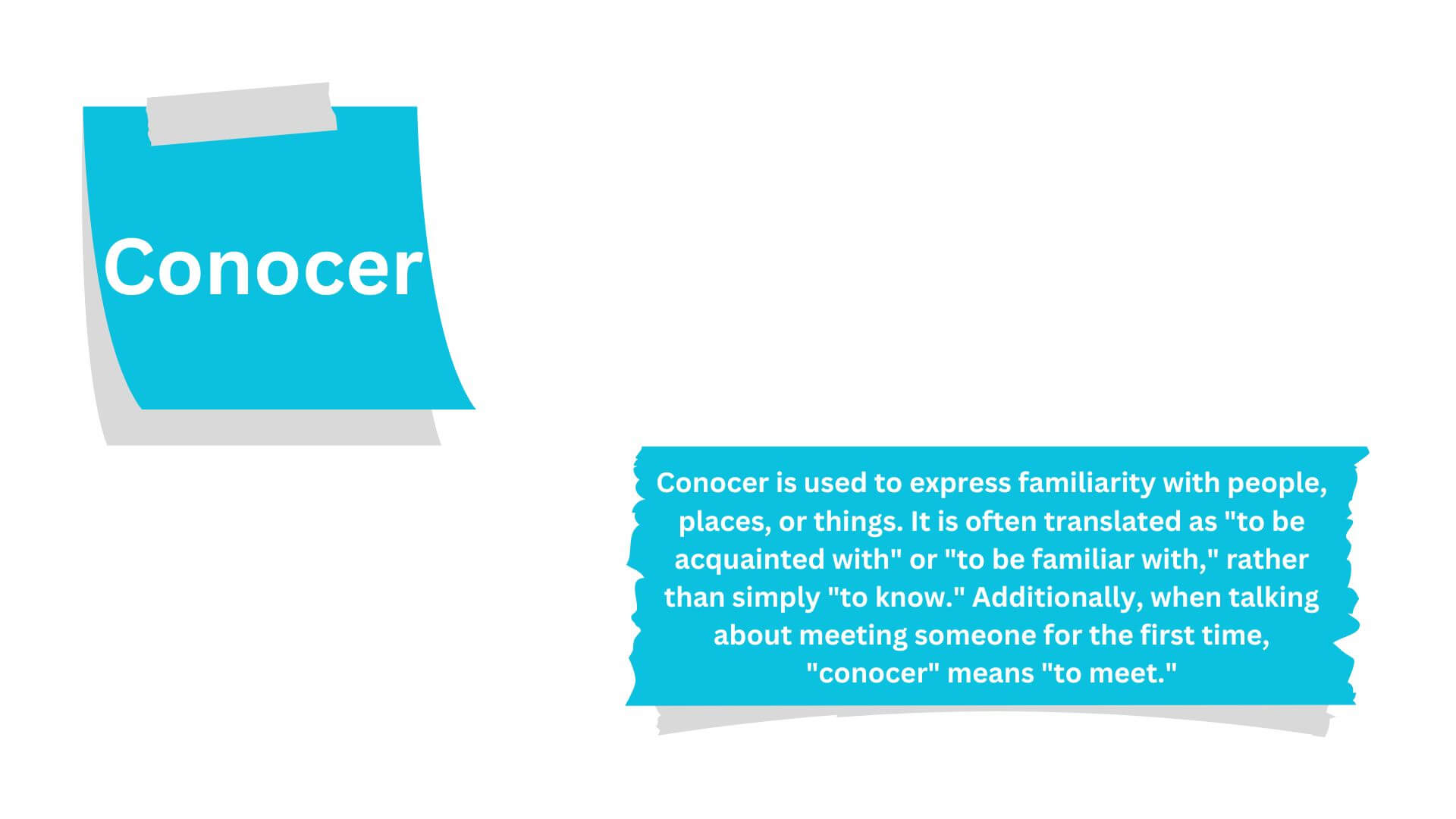In Spanish, the verbs ‘saber’ and ‘conocer’ both mean ‘to know,’ but we use them in different ways. ‘Saber’ is for knowing facts or how to do something. It’s about knowledge that is more theoretical or involves skills. On the other hand, ‘conocer’ is about being familiar with people, places, or experiences. Getting these verbs right is key to speaking Spanish well. Knowing when to use each one helps you catch nuances in conversations that might not be obvious if Spanish isn’t your first language.
Understanding the Difference Between Saber and Conocer
In Spanish, saber and conocer both translate to “to know” in English, but they are used in different contexts depending on the kind of knowledge being referred to.
- Saber is typically used for factual or skill-based knowledge:
- Saber = To know how or To know a fact.
- Conocer refers to familiarity or acquaintance:
- Conocer = To be familiar with or To meet.
If you’re unsure which verb to use, ask yourself if the knowledge you’re referring to involves a fact, skill, or specific piece of information (saber) or if it involves being familiar with or acquainted with a person, place, or thing (conocer). Let’s now learn both terms in detail.
Saber: To know (Facts, Information, or How to Do Something)
Main Concept:

Saber refers to knowing specific, concrete facts or having knowledge about something. It’s also used when referring to a skill or ability—essentially knowing “how” to do something.
Key Uses of Saber:
- Knowing facts or information: When you want to express that you have factual knowledge about something, whether it’s trivia, knowledge acquired from learning, or specific pieces of information.
- Knowing how to do something (skills): When talking about skills or abilities, “saber” is used with an infinitive verb to express that you know how to perform a task or action.
- Knowledge of questions or indirect information: When dealing with questions starting with words like “dónde” (where), “qué” (what), or “cuándo” (when), saber is the appropriate verb.
Common Structures with Saber:
- Saber + que (to know that…): Introduces factual statements.
- Yo sé que tú tienes razón. (I know that you are right.)
- Saber + infinitive (to know how to…): Describes knowledge of a skill or ability.
- Saben bailar salsa. (They know how to dance salsa.)
- Saber + question word (to know where, what, how, etc.): Describes knowledge of information.
- ¿Sabes dónde está el restaurante? (Do you know where the restaurant is?)
- Saber de (to know about something): Expresses having knowledge on a topic or subject.
- Ella sabe mucho de historia. (She knows a lot about history.)
Examples of Saber in Context:
- Sé que mañana va a llover. (I know that it’s going to rain tomorrow.)
- ¿Sabes hablar francés? (Do you know how to speak French?)
- Ellos no saben la respuesta. (They don’t know the answer.)
- No sé cómo llegar a tu casa. (I don’t know how to get to your house.)
Special Use of Saber: To taste
In some contexts, saber is also used to describe how something tastes:
- Este pastel sabe a chocolate. (This cake tastes like chocolate.)
Also Read: How To Say “I Miss You” In Spanish: 35 Unique Ways To Express Missing Someone
Conocer: To know (People, Places, or Being Familiar with Something)
Main Concept:

Conocer is used to express familiarity with people, places, or things. It is often translated as “to be acquainted with” or “to be familiar with,” rather than simply “to know.” Additionally, when talking about meeting someone for the first time, “conocer” means “to meet.”
Key Uses of Conocer:
- Knowing people: When you are acquainted with or familiar with a person, you use “conocer.” This refers to interpersonal relationships.
- Knowing places: When you have visited or are familiar with a place (city, country, or specific location), you use “conocer.”
- Knowing things: If you are familiar with a concept, book, movie, or any object, “conocer” expresses that familiarity. It’s not as concrete as saber but refers more to general awareness or experience with the thing.
Common Structures with Conocer:
- Conocer + a + person (to know a person): Refers to being acquainted with or having met someone.
- Conozco a tu hermano. (I know your brother.)
- Conocer + place (to know/be familiar with a place): Refers to having been to or being familiar with a location.
- Conocemos Nueva York. (We know [have been to] New York.)
- Conocer + thing (to be familiar with something): Refers to being familiar with a book, movie, concept, or piece of information.
- ¿Conoces esta canción? (Are you familiar with this song?)
Examples of Conocer in Context:
- ¿Conoces a Juan? (Do you know Juan?)
- Conocemos bien esta ciudad. (We know this city well.)
- Ella conoce muy bien el arte moderno. (She knows modern art very well.)
- Voy a conocer a tus padres mañana. (I’m going to meet your parents tomorrow.)
Special Use of Conocer: Meeting someone for the first time
- Ayer conocí a tu amiga. (Yesterday I met your friend.) In this case, conocer means meeting or being introduced to someone for the first time.
Also Read: Tu Vs. Usted In Spanish: Key Differences & Usage Guide
Key Differences Between Saber and Conocer:
| Context | Saber | Conocer |
|---|---|---|
| Knowledge of facts or information | Sé la respuesta. (I know the answer.) | Conozco la respuesta. (Incorrect) |
| Knowing how to do something | Sé conducir. (I know how to drive.) | Conozco conducir. (Incorrect) |
| Knowing a person | Sé quién es María. (I know who María is.) | Conozco a María. (I know María / I’ve met María.) |
| Knowing a place | Sé dónde está Madrid. (I know where Madrid is.) | Conozco Madrid. (I’m familiar with Madrid / I’ve been there.) |
| Familiarity with a thing | Sé mucho de esta película. (I know a lot about this movie.) | Conozco esta película. (I’m familiar with this movie.) |
Conclusion
To sum it up, it’s really important to know how to use the Spanish verbs ‘saber’ and ‘conocer’ correctly if you want to speak Spanish well. ‘Saber’ is all about knowing facts or how to do something, while ‘conocer’ is about being familiar with people or places. By using these verbs correctly, you can talk more clearly and accurately. Keep practicing them in different situations, and you’ll find yourself having better and more meaningful chats in Spanish. Keep visiting the Translation Blog for more articles like this.

